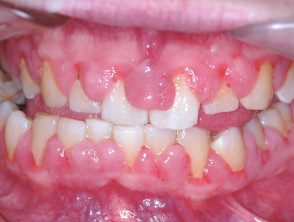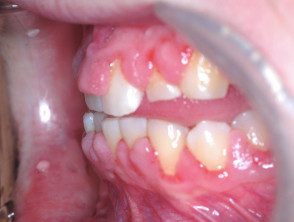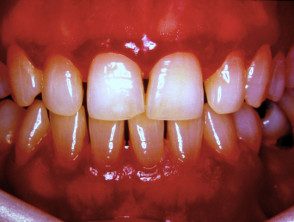What is it gingival extension?
Gingival enlargement refers to excessive growth of the gums, and may also be known as gingival enlargement. hyperplasia or hypertrophy.
Gingival enlargement

Gingival enlargement

Gingival enlargement

Adverse skin reaction to anticonvulsant gingival hyperplasia
What are the possible causes?
In many cases the cause is unknown. The affected tissue may be inflamed (gingivitis), in which case the gums are red, soft, shiny, and bleed easily. Gingivitis can be located or generalized.
Specific causes of gingivitis include:
- Poor dental hygiene resulting in bacterial license plate, gingivitis and periodontitis
-
Smoking, mouth breathing and overcrowded teeth
- Systemic diseases especially diabetes, HIV infection
Non-inflamed gingival enlargement tends to be a darker red or purple. It may be soft, bleeding easily, or firm and fibrous. It is also more likely to occur in people with poor dental hygiene. Causes include:
- Hormonal states: pregnancy, puberty;
- Nutritional deficiency: scurvy (vitamin C deficiency);
- Medications, most often cyclosporine, phenytoin and other anticonvulsants, calcium channel blockers. Rarely, it may be due to antibiotics, antidepressants, and other medications.
- Genetic conditions, often present at birth (all conditions rare): hereditary fibromatosis, I cell disease, mucopolysaccharidosis, fucosidosis, aspartyl glucosaminuria, Pfeiffer syndrome, infantile systemic hyalinosis and primary amyloidosis. Localized gingival enlargement may be seen in Fabry disease, Cowden syndrome, tuberose sclerosisSturge-Weber angiomatosis and gingival granule cells tumor.
- Blood conditions such as acute leukemia, lymphoma or aplastic anemia;
- Systemic diseases most often granulomatosis with polyangiitis, sarcoidosis, Crohn's disease, type 1 neurofibromatosis, primary amyloidosis, Kaposi sarcoma and acromegaly.
What are the symptoms?
Gingival enlargement can cause discomfort, interfere with speaking or chewing, cause halitosis (bad breath odor), and may appear unpleasant.
What is the treatment for gingival hyperplasia?
Treatment depends on the underlying cause. Gingivitis can improve with the following measures:
- Removal of bacterial plaque by brushing and flossing.
- Antiseptic mouthwashes such as chlorhexidine
- Ultrasonic treatments
- Courses of antibiotics to reduce oral bacterial load (e.g., erythromycin or azithromycin)
Medications known to cause gingival enlargement should be discontinued. Gingivectomy (surgical removal of overgrown gum tissue) may be necessary for severe cases and can be repeated if necessary.

